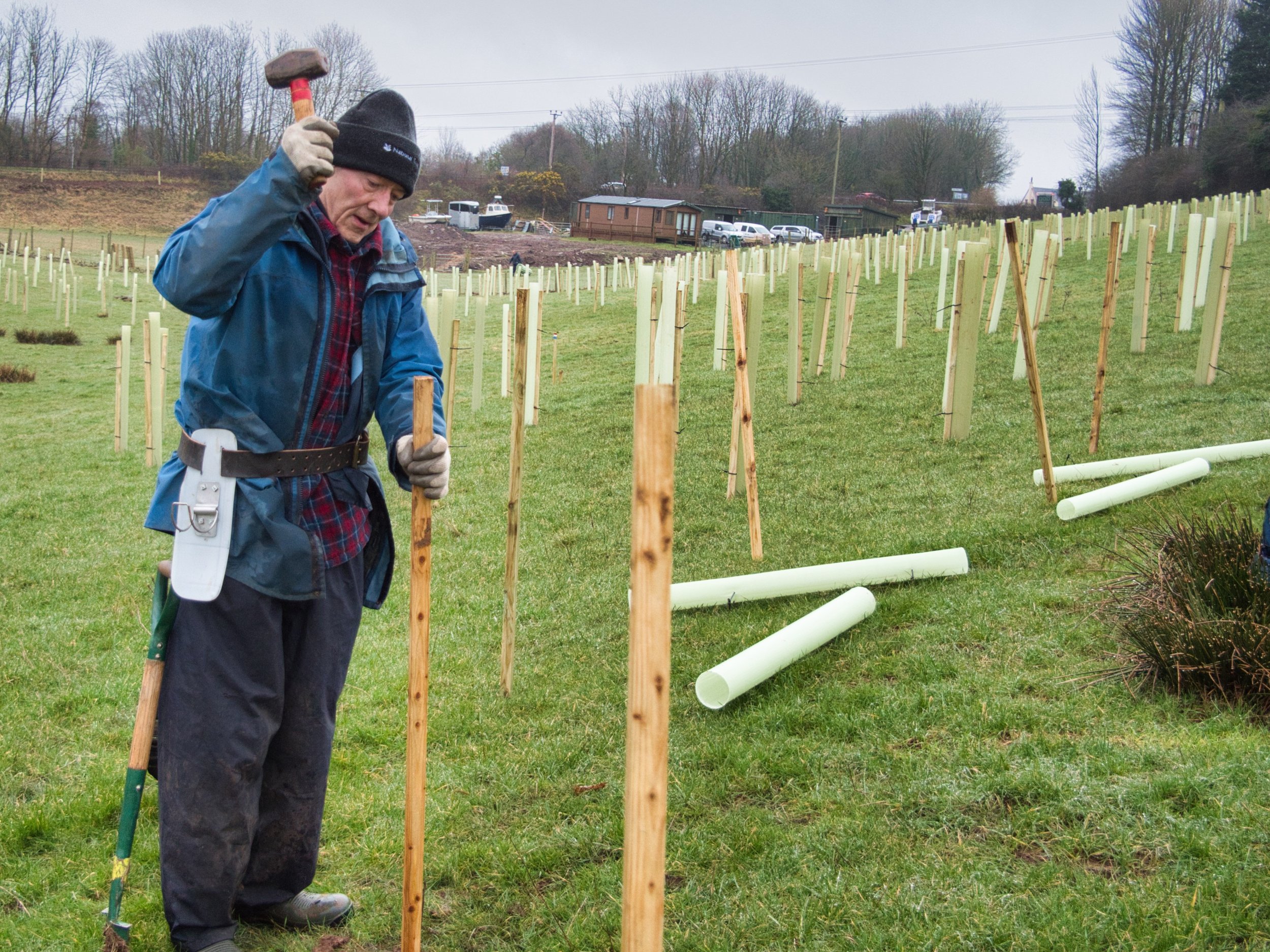Keekle

DATE:
2024 / 2025
LOCATION:
Woodend, Keekle (West Cumbria)
PARTNERS:
West Cumbria Rivers Trust, Forestry Commission, Natural England, Environment Agency
Repurposing land for conservation
Aims
Establish native woodland on existing grazing land and along the bank of the River Keekle.
Increase biodiversity and create diverse habitats.
Create volunteering opportunities for local people to utilise their skills and learn more about woodland creation.
Improve water quality for the freshwater pearl mussel population downstream.
Keekle is a site in West Cumbria near Cleator, initially identified through the landowner via West Cumbria Rivers Trust. The land owner was encouraged to chat with Raise to see if the flexible funding for the Community Forest could be useful for their vision for the site. West Cumbria Rivers Trust then remained involved in project delivery and volunteer engagement.
The site has private landowners who traditionally used the riverside area as a paddock for grazing. However, with the land no longer needed for horses or livestock, they sought to repurpose it for conservation. The site, spanning 1.57 hectares, features a steep slope down to the River Keekle on one boundary, with old hedgerows surrounding the rest.
Its proximity to Longlands Lake and existing woodland made it an ideal location to plant trees, enhance biodiversity, and improve connectivity in the wider landscape. The site is positioned near the confluence of the Keekle and the Ehen, home to 90% of England’s freshwater pearl mussels. The newly created woodland will improve river health and water quality by reducing soil, nutrient, and fertilizer runoff. Additionally, the trees will contribute to flood alleviation by intercepting rainfall and reducing runoff.
This project implemented a mixed-density planting scheme featuring thirteen native tree species: sessile oak, birch, crab apple, bird cherry, rowan, elder, hazel, dog rose, guelder rose, hawthorn, dogwood, blackthorn, and willow. A riparian zone at the field's lower end was planted with lower-density species suited to periodic flooding. The steeper slopes were planted with a high-density cross-slope mix of 2,400 stems per hectare to minimize runoff. A glade was included with lower-density planting to allow more sunlight, fostering diverse habitats.
New hedgerows were planted along the boundaries of the newly forested area and adjacent smaller fields that will continue to be grazed by horses. Wide hedgerows were also added along the roadside boundary, linking existing woodland and scrub near the river with the new planting areas while buffering existing woodland edges.
West Cumbria Rivers Trust oversaw planting efforts, coordinating multiple volunteer groups, school groups, and corporate participants. Led by volunteer coordinator Sara, the team organized several planting days. Experienced volunteers, who regularly work with the Rivers Trust, National Trust, and Wild Ennerdale, played a vital role in ensuring the project’s success.
The opportunities for tree planting and environmental work have fostered a dedicated volunteer community, particularly among retirees who enjoy collaborative nature-based restoration projects. These community forest initiatives have become a key component of their voluntary work portfolio.
Sara from the West Cumbria Rivers Trust has cultivated a welcoming environment for volunteers, maintaining strong relationships with them. The volunteers, in turn, appreciate the sense of community, connection with nature, and access to otherwise restricted land.
The Keekle site is an outstanding example of engaging the local community on private land while maximizing ecological and environmental benefits.
25
Volunteers
3,448
Number of trees
1.57
Hectares of woodland planted
Project Impact
Contribution to Net Zero:
Establishment of native mixed broadleaf woodlands.
Planting 3,448 trees will help sequester carbon, contributing to net-zero targets.
Public Access and Community Engagement:
Although public access is generally restricted, local volunteers actively participated in tree planting and engaged with West Cumbria Rivers Trust.
The site is visible from the roads, enhancing the landscape.
Schools, corporate groups and volunteers, contributed to the planting process.
Flood Mitigation:
Tree planting will help reduce rainwater runoff and prevent sediment / soil loss.
Trees intercept rainfall and stabilise slopes, mitigating flood risks.
Health and Wellbeing:
The project provided active engagement opportunities across multiple planting days.
Volunteers worked at their own pace, benefitting from social interactions and community-building experiences.
Education and Skills:
Volunteers gained tree-planting skills and applied existing expertise to support the project.
Volunteers are encouraged to participate in other regional conservation efforts.
Nature and Biodiversity:
The project includes a variety of species and planting densities, creating riparian zones, hedgerows, woodlands and glades.
New habitats and ecological corridors connect to the river, enhancing biodiversity.
Improved water quality benefits the local freshwater pearl mussel population.






